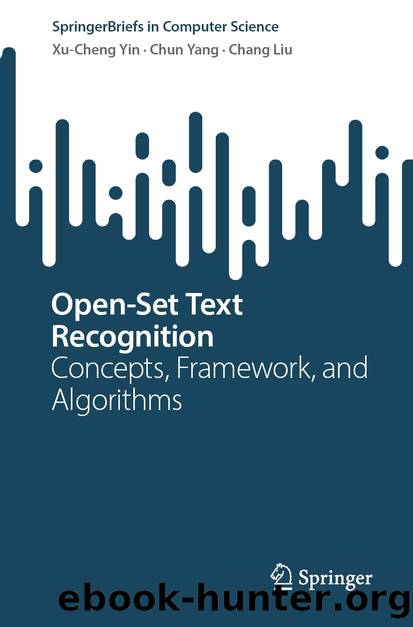Open-Set Text Recognition by Xu-Cheng Yin & Chun Yang & Chang Liu

Author:Xu-Cheng Yin & Chun Yang & Chang Liu
Language: eng
Format: epub
ISBN: 9789819703616
Publisher: Springer Nature Singapore
4.1.3.1 Knowledge Driven
One trivial choice would be to represent each character with a human-defined knowledge. Specifically, each character is represented with a set of or an ordered sequence of attributes designed by experts.
The most known design would be the Radical Sequences [27â30], which is mostly seen in zero-shot Chinese text recognition methods, the majority represents each character with a traverse of its radical tree. Radical representations are also seen to represent Japanese [31] characters in other tasks. Besides the traverse representation, a bag of radicals [32] can theoretically be used as well, however, a side representation would be needed to resolve coding conflicts.
Stroke sequence [24, 33â35] is also a popular representation. The representation sometimes yields coding conflicts. To alleviate this problem, some methods are seen to be jointly used stroke sequence with the whole word representation. More abstracted codings like different IME codes [36] are also sometimes seen as a representation.
Beyond CJK languages, despite knowledge driven whole word representations are seen in Bengali [9] and Latin [8, 10], character-level representations are not common, perhaps due to the high coding conflict rate, less demands, or lack of domain knowledge for some languages.
Download
This site does not store any files on its server. We only index and link to content provided by other sites. Please contact the content providers to delete copyright contents if any and email us, we'll remove relevant links or contents immediately.
The Mikado Method by Ola Ellnestam Daniel Brolund(23572)
Hello! Python by Anthony Briggs(22707)
Secrets of the JavaScript Ninja by John Resig Bear Bibeault(21526)
Kotlin in Action by Dmitry Jemerov(20570)
Dependency Injection in .NET by Mark Seemann(20491)
The Well-Grounded Java Developer by Benjamin J. Evans Martijn Verburg(20388)
OCA Java SE 8 Programmer I Certification Guide by Mala Gupta(19538)
Algorithms of the Intelligent Web by Haralambos Marmanis;Dmitry Babenko(18334)
Grails in Action by Glen Smith Peter Ledbrook(17458)
Adobe Camera Raw For Digital Photographers Only by Rob Sheppard(16976)
Sass and Compass in Action by Wynn Netherland Nathan Weizenbaum Chris Eppstein Brandon Mathis(14871)
Secrets of the JavaScript Ninja by John Resig & Bear Bibeault(12834)
Test-Driven iOS Development with Swift 4 by Dominik Hauser(11242)
A Developer's Guide to Building Resilient Cloud Applications with Azure by Hamida Rebai Trabelsi(10603)
Jquery UI in Action : Master the concepts Of Jquery UI: A Step By Step Approach by ANMOL GOYAL(10487)
Hit Refresh by Satya Nadella(9138)
The Kubernetes Operator Framework Book by Michael Dame(8544)
Exploring Deepfakes by Bryan Lyon and Matt Tora(8372)
Robo-Advisor with Python by Aki Ranin(8318)
